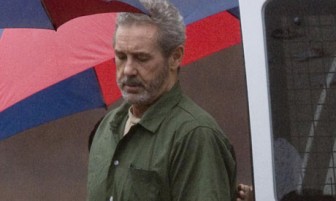HOUSTON (Reuters) – Allen Stanford was convicted today of running a $7 billion Ponzi scheme, a verdict that caps a riches-to-rags trajectory for the former Texas financier and Caribbean playboy.
It was a vindication for the U.S. government, which closed down Stanford’s financial empire in February 2009 but had failed for years to address signs that the empire was built on air. The Stanford case was the biggest financial fraud since Bernard Madoff’s.
 Stanford was found guilty on 13 counts of a 14-count criminal indictment, including fraud, conspiracy and obstructing an investigation by the U.S. Securities and Exchange Commission. He was found not guilty on one count of wire fraud. The charges carry a possible prison sentence of nearly 20 years.
Stanford was found guilty on 13 counts of a 14-count criminal indictment, including fraud, conspiracy and obstructing an investigation by the U.S. Securities and Exchange Commission. He was found not guilty on one count of wire fraud. The charges carry a possible prison sentence of nearly 20 years.
The verdict came less than a day after a Houston federal jury said it could not reach a verdict, and U.S. District Judge David Hittner instructed jurors to keep deliberating.
Still, the verdict may prove only a moral victory for Stanford’s victims, most of whom have received none of their money back.
Stanford’s personal fortune was once valued at $2.2 billion.
During a six-week trial, prosecutors told how Stanford, 61, repeatedly raided the bank he owned in Antigua, Stanford International Bank, using it as his “personal ATM.”
He bought a castle in Florida for one of his girlfriends and his oldest daughter lived in a million-dollar condominium in Houston. He wore custom-made suits, lived in luxury homes and on a yacht in the Caribbean and bankrolled a $20 million prize for an international cricket tournament.
The government’s star witness, former Stanford aide James Davis, testified that he and Stanford faked documents and made up financial reports to calm investors and fool regulators. They funneled millions of dollars from Stanford International Bank to a secret Swiss bank account that Stanford tapped for his personal use, Davis testified.
Davis, 63, has pleaded guilty to three criminal counts.
Stanford’s lawyers portrayed their client as a visionary who was not involved in his firm’s daily activities. They blamed Davis for any fraud and argued that Stanford’s businesses were viable until the government shut down Stanford Financial Group in Houston in February 2009. Left with no money, Stanford was declared indigent by the court and his defense was paid for with public funds.










